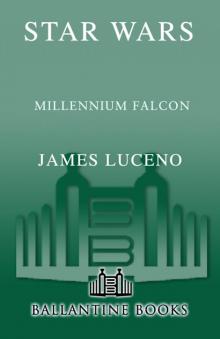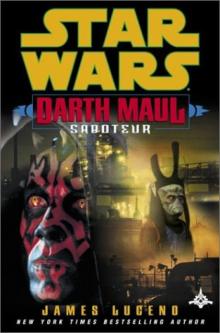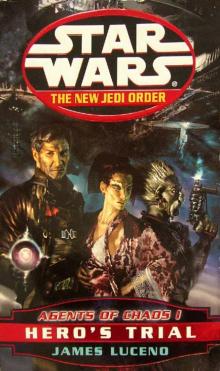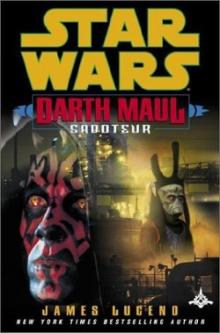- Home
- James Luceno
Darth Plagueis Page 9
Darth Plagueis Read online
Page 9
The Muuns believed in formulas and calculations as strongly as the Bith did, but Plagueis was not a fatalist. Convinced that Tenebrous’s brilliant equations were missing an important factor, he had argued that future events — whether predicted by machines or glimpsed in visions — were often clouded and unreliable. More important, he had been raised to believe in the elimination of competitors, and viewed the Jedi as just that. The Order wasn’t simply some rival corporation that could be secretly acquired; it had to be undermined, toppled, and dismantled. Deracinated. He had assumed that, given time, he would have been able to win Tenebrous over, but his former Master had obviously pronounced him unfit to don the mantle of Sith successor, and had looked elsewhere. The unbridled desires of sentients were a blessing to the Sith, for those desires birthed an abundance of zealous and audacious beings who could be used to further the cause. Plagueis had been instructed to be on the lookout for suitable beings, just as Tenebrous had been when he had discovered Venamis. Perhaps Tenebrous had regarded the sneak attack as beneficial, no matter the results. Had Venamis been victorious, he was deserving of the mantle; and if not, then Plagueis might come to accept the true nature of the Master — apprentice relationship.
An old story that had never made much sense to him.
But it did explain Tenebrous’s curious behavior in the months and weeks preceding the events on Bal’demnic. It was impossible to know how long Venamis’s attack had been in the planning, but Tenebrous, for all his cool detachment, had plainly worried over the decision. On Bal’demnic he had been distracted, and that inattention had cost him his life. But in those final moments, before he had fully grasped the role Plagueis had played, he had been on the verge of revealing the existence of Venamis. It made little difference now, and, in fact, Plagueis found the Bith’s vacillation contemptible.
Like Plagueis, Tenebrous had obviously embraced the fact that Darth Bane’s Rule of Two had expired. Precious few Sith Lords had honored it, in any case, and with good reason, as Plagueis saw it. The goals of the Grand Plan were revenge and the reacquisition of galactic power. But while most Sith Lords since Bane had in their own fashion helped to weaken the Republic, their efforts had owed less to selflessness and allegiance to the Rule than to weakness and incompetence. Driven to discharge Bane’s imperative they might have been, and yet each had fallen prey to individual foibles and eccentricities, and so had failed to exact revenge on the the Jedi Order. Plagueis understood. He would never have been one to lay in wait or devote his reign merely to positioning a subsequent Sith Lord for success. Nor would he have been content to remain in Tenebrous’s shadow as an apprentice had the Bith actually triumphed where others had failed.
How, in all his wisdom, had Tenebrous failed to grasp that Plagueis was the culmination of the millennium-long hunger for revenge? How had the Bith failed to grasp that destiny had called him?
In a rare moment of compliment, the Bith had even said as much.
In the same way that tectonic forces cause a boulder to plunge into a river, forever diverting its course, events give rise to individuals who, stepping into the current of the Force, alter the tide of history. You are such a one.
Was Plagueis now to believe that Tenebrous had also considered Venamis such a one?
If so, it demeaned him.
The data discovered aboard Venamis’s starship failed to shed light on how old he’d been when Tenebrous found him, or reveal anything about his training. Set ways of training an apprentice were a thing of the past, regardless. Doctrine was for the Jedi. Where the Jedi courted power, the Sith lusted after it; where the Jedi believed they knew the truth, the Sith possessed it. Owned by the dark side, they ultimately became their knowledge.
For the past five hundred years, the Sith of the Bane line had eschewed selecting children as apprentices, finding it more advantageous to discover beings who had already been hardened or scarred by life.
Plagueis, though, had been an exception.
Muunilinst had not followed suit when, in the madness that was the Third Great Expansion, worlds of the Core and the Inner Rim had stretched out to settle and claim many of the planets surveyed and made available by the Colonization Act and the Planet Grant Amendment. The reason was simple: though the Muuns had wealth beyond the wildest dreams of many species and access to starships of the highest quality, they were unwilling to leave their holdings on Muunilinst unattended. Nor were they interested in colonization for its own sake — in spreading their seed — because the more Muuns the galaxy contained, the less wealth there would be to go around.
Eventually, though, autarky and isolationism ceded to a desire to make themselves essential to the galaxy, and the Muuns began to fund settlements established by other worlds, or by independent groups, self-exiled as often as not. And so colonies at the distal end of the Braxant Run became dependent on Muunilinst for support, borrowing against the promise of discovering rich veins of ore or precious metals. When, however, the purported treasures failed to materialize, or markets became saturated, resulting in lower prices, the careworn populations of those settlements found themselves hopelessly indebted to Muunilinst and were forced to accept direct oversight by the Muuns.
So it happened that Plagueis’s clan father, Caar Damask, came to be administrator of the treasure world of Mygeeto.
Located in Muunilinst’s own stellar neighborhood, and a fertile breeding ground for nova, artesian, and low-level Adegan crystals, Mygeeto—Gem, as it was known in the ancient Muun tongue — was also one of the least hospitable worlds the Muuns had acquired. Captive to snow and ice, the planet boasted few indigenous life-forms and was continually assailed by storms that mounded its surface into crystal spurs the size of mountains. Regardless, and at great expense, the Muuns had succeeded in constructing a few self-contained cities and storage vaults, powering them with energy derived from the crystals themselves. Even in the best of instances Mygeeto was a challenge to approach because of its asteroid ring, but the asteroids became secondary impediments once the InterGalactic Banking Clan assumed control of mining operations in the ice shelves and glaciers. Then even the Jedi were prohibited from visiting without prior authorization.
Already a member of long standing in the IBC, the elder Damask had accepted the assignment as a personal favor to Muunilinst’s High Officer, Mals Tonith, but more in the hope of advancing a career that had stalled and kept him confined to middle management. Unrecognized for his genius and angry about it, Damask had left his primary wife and clanmates behind and had attempted to build if not a life then at least a career for himself on the remote ice world. Success in supervising the mining operations came in short order, but contentment, of any sort, proved elusive until the arrival — ten years after his own — of a lower-caste Muun female who would first become his assistant, then his codicil wife, in due course giving birth to a son they named Hego, after Caar’s clan father.
His upbringing in a domed city in a perpetually frozen environment was in many ways the antithesis of the typical Muun childhood, and yet young Hego managed not only to endure but to prosper. His mother took what some considered to be an unhealthy interest in his development, recording every detail and encouraging him to share even his most furtive thoughts with her. She was especially interested in observing his interactions with playmates — of diverse species — which she was never at a loss to provide, interrogating him after every session about his feelings about this or that youngling. Even Caar found time enough from a demanding schedule to be a doting parent.
Hego was not yet five years old when he began to sense that he was somehow different. Not only was he more astute than his playmates, but he could often manipulate them, arousing laughter when he wished to, or just as often tears; comfort just as often as anxiety. He learned to read intentions and body language. When he sensed that someone didn’t like him he would go out of his way to be generous, and when he sensed that someone liked him too much he would occasionally go out of his way to be difficult, as a
means of testing the limits of the relationship. He divined tricks and deceits, and sometimes allowed himself to play the victim, the dupe, out of concern for arousing unwanted suspicion or being forced to reveal too much about his hidden talents.
As his abilities increased, other children became playthings rather than playmates, but with no loss of enjoyment on Hego’s part. One afternoon a Muun youngster he had grown to dislike pushed his way past Hego in an effort to be first to reach a staircase that led down to the Damask home’s lower-level courtyard. Grabbing his peer by the upper arm, Hego said, “If you’re in such a rush to get downstairs, then jump out the window.” Locking glances, Hego repeated the suggestion, and his victim took it to heart. Many questions were asked after the youngling’s broken body was discovered in the courtyard, but Hego kept the truth from everyone but his mother. She made him go over his explanation in increasing detail, until finally saying, “I’ve long suspected that you have the gift your father and I share, and now I know it to be true. It’s a strange, wondrous power, Hego, and you have it in abundance. Your father and I have spent our lives keeping our gifts a closely guarded secret, and I want your word that for the time being you will speak of it only to me or to him. Later in life this power will serve you well, but right now it must remain undisclosed.”
Having lived a surreptitious life for so many years, Hego found the notion of sharing the secret only with his parents completely natural.
No one held him responsible for his playmate’s plunge from the window, but, soon after, the steady stream of playmates began to dry up. Worse, his father began to grow distant — even while Hego found himself becoming more and more a part of Caar’s world. He considered that his father might be lying about having the power, or had come to think of Hego as some kind of monster. And yet he observed his father employing his eldritch powers of persuasion and manipulation in business dealings.
Like Muunilinst, Mygeeto received many important visitors, and at times it struck Hego that, in lieu of his being able to explore the galaxy, the galaxy was coming to him. On several occasions, his father met with Jedi Knights and Padawans who came in search of Adegan crystals, which the Jedi Order used in the construction of training lightsabers. Hego had long since perfected his ability to mask his powers from others. Even without revealing his true nature to the Jedi he was able to sense in them a kind of like-minded power, though one that was clearly at cross purposes with his own. From early on he knew that he could never be one of them, and he began to abhor their visits, for reasons he couldn’t grasp. Even more puzzling, he came to sense a power closer to his own in a Bith visitor named Rugess Nome. Nome wasn’t a Jedi but a starship engineer, who arrived in a luminous vessel of his own design. Before long, however, Hego began to suspect that his mother was the reason for Nome’s frequent visits. And the suspicion that there was something between them incited feelings of anger and jealousy in young Hego, and a kind of conflicted despondency in his father.
Hego had made up his mind to bring his power to bear on the intolerable situation when, during one of Nome’s visits, he was summoned to his father’s office, where Caar, his mother, and the Bith were waiting. Without looking at his wife, Caar had said, “You are of our blood, Hego, but we can no longer raise you as our progeny.”
Hego had looked from his father to his mother in mounting distress, fearing the very words Caar added a moment later. With a nod toward Nome, he said, “In truth, and in ways that you will eventually come to understand, you belong to him.”
A decade later, Hego would learn that while Caar had, in fact, done his best to keep his Force abilities to himself, he had come to the attention of Nome when the two had chanced to meet on High Port Space Center. Years would pass before Nome found Hego’s mother, whom he had conscripted not as an apprentice — for she wasn’t strong enough in the Force — but as a disciple, whose task it had been to romance Caar and bear the fruit of that seduction: a child whom Nome and Bith science predicted would be born strong in the Force. Hego’s parents had safeguarded the secret until his power had begun to reveal itself. And then a deal had been brokered: Hego, in exchange for the realization of Caar Damask’s lifelong dream of being accepted into the upper echelon of the InterGalactic Banking Clan.
Five years after the revelation in the office, Caar was recalled to Muunilinst to become director of the treasury branch of the IBC. Hego’s mother vanished, never to be seen again by either husband or son. And Hego’s apprenticeship to Sith Lord Darth Tenebrous commenced.
In addition to being widely respected as a savant engineer and starship designer, Rugess Nome headed a shadowy organization that over the decades had gathered intelligence on the dealings of nearly every criminal, smuggler, pirate, and potential terrorist who had left a mark on the galaxy. With young Hego masquerading as Nome’s accountant, the two secret Sith had traveled widely, often conspiring with the galaxy’s most notorious beings, and facilitating anarchy whenever possible.
We Sith are an unseen opposition, Tenebrous had told his young apprentice. A phantom menace. Where the Sith once wore armor, we now wear cloaks. But the Force works through us all the more powerfully in our invisibility. For the present, the more covert we remain, the more influence we can have. Our revenge will be achieved not through subjugation but by contagion.
As Tenebrous explained it, the Jedi had emerged strong from the war of a millennium earlier, and while Darth Bane and subsequent Sith Lords had done their best to disrupt the reborn Republic, they labored at a disadvantage. So eventually it was decided that the Sith should hide in plain sight, amassing wealth and knowledge, and securing contacts and alliances with groups that would one day form the basis of a galaxywide opposition to both the Republic and the revered Order that served it. By all accounts those early centuries had been challenging, watching the Jedi return to their eminent position. But the Sith had had the luxury of studying the Order from afar without the Jedi ever being aware that they had adversaries.
The rend that Tenebrous’s Twi’lek Master had opened in the fabric of the Force had been felt by the Jedi, and already the Order was beginning to show signs of circumspection and languor. The Republic, too, had been similarly undermined, by encouraging corruption in the Senate and lawlessness in the Outer Rim systems, which had become the dumping grounds for the Core.
With the wretched of the galaxy being converted to the cause, the powerful would now need to be brought together, with Darth Plagueis as their leader, manipulating the actions of an important few to control the behavior of countless trillions.
8: VICTIMS OF THEIR OWN DEVICE
In training Venamis, Tenebrous had obviously believed that he was protecting the Grand Plan; Venamis, too, by keeping an eye on a handful of Forceful candidates he, or perhaps Tenebrous, had discovered. But now it fell to Plagueis to do something about those potential competitors, if for no other reason than to eliminate the possibility of another surprise attack.
Venamis’s ship data banks contained information on six beings, but subsequent investigation by 11-4D revealed that one had died of natural causes, another was executed, and a third was killed in a cantina brawl. Two of the remaining three were unnamed, but Plagueis and 11-4D had succeeded in learning as much about them as Venamis knew, after cracking the complex code the Bith had used to safeguard the entries. How Venamis’s candidates had escaped notice by the Jedi was something of a mystery, but one scarcely worth solving. Plagueis simply had to determine whether they posed a threat — to him or to the Grand Plan.
Muuns were seldom glimpsed quaffing Rywen’s Reserve in exclusive tapcafs, sampling refined spice in members-only clubs, or challenging the house in marathon sabacc tournaments. HoloNet celebrity programs never showed them with Twi’lek dancers on their slender arms, or venturing into forests, seas or mountain ranges purely for sport or adventure.
But Plagueis was about to break with tradition, now that the first of Venamis’s potential candidates had been traced to a casino in Lianna City, in
the heart of the remote Tion Cluster.
Jowls quivering, limpid eyes reflecting concern, and flanked by Nikto security personnel, the pudgy Sullustan manager of Colliders Casino hurried across the carpeted lobby toward the concierge desk where Plagueis and 11-4D were waiting. A pair of broad-purpose utility arms — one of which concealed a laser weapon — substituted for the droid’s normal surgical appendages, and Plagueis was attired in what most beings would assume was Banking Clan garb, though differently cut and paler green in color.
“Welcome, sir, welcome,” the manager began in a flustered voice. “Colliders is honored to have you as a guest, though may I say that you are the first being from Muunilinst to have used the casino’s public entrance. The private entrance—”
Plagueis raised a hand to cut him off. “I’m not here on bank business.”
The Sullustan stared. “Then this isn’t an impromptu audit?”
“I’m here regarding a private matter.”
The manager cleared his throat and stood up straighter. “Then perhaps we could begin with your name.”
“I am Hego Damask.”
The Sullustan’s jowls began to quiver again. “Magister Damask? Of Damask Holdings?”
Plagueis nodded.
“Forgive me for not recognizing you, sir. Were it not for your munificence, Colliders would be in bankruptcy. More to the point, Lianna City wouldn’t be the hub it is today, and the pride of the Tion Cluster.”
Plagueis smiled pleasantly. “Then if we might adjourn to your office …”
“Of course, of course.” The Sullustan signaled the guards to form a phalanx, then waved courteously for Plagueis and 11-4D to follow. “After you, sir. Please.”
A turbolift carried them directly into a large office that overlooked the casino’s main gaming room, which was crowded with Mid and Outer Rim species patrons seated at tables and individual machines, or huddled around ovide and jubilee wheels and other gambling devices. The manager gestured Plagueis into an overstuffed chair and settled himself at a reflective desk. OneOne-FourDee stood quietly at Plagueis’s side.

 Darth Plagueis
Darth Plagueis Memories End
Memories End Star Wars: Dark Lord: The Rise of Darth Vader
Star Wars: Dark Lord: The Rise of Darth Vader Star Wars Darth Maul: Saboteur
Star Wars Darth Maul: Saboteur Star Wars: Millennium Falcon
Star Wars: Millennium Falcon Jedi Eclipse
Jedi Eclipse Star Wars The New Jedi Order - Agents of Chaos II - Jedi Eclipse - Book 5
Star Wars The New Jedi Order - Agents of Chaos II - Jedi Eclipse - Book 5 Star Wars - Darth Maul - Saboteur
Star Wars - Darth Maul - Saboteur Star Wars: Cloak of Deception
Star Wars: Cloak of Deception Star Wars: New Jedi Order: Agents of Chaos II: Jedi Eclipse
Star Wars: New Jedi Order: Agents of Chaos II: Jedi Eclipse End Game
End Game Tarkin: Star Wars
Tarkin: Star Wars Restraint
Restraint Star Wars - Cloak Of Deception
Star Wars - Cloak Of Deception Star Wars: New Jedi Order: Agents of Chaos I: Hero's Trial
Star Wars: New Jedi Order: Agents of Chaos I: Hero's Trial Star Wars The New Jedi Order - Hero's Trial - Book 4
Star Wars The New Jedi Order - Hero's Trial - Book 4 The Essential Novels
The Essential Novels Darth Maul: Saboteur
Darth Maul: Saboteur Hero's Trial: Agents of Chaos I
Hero's Trial: Agents of Chaos I Saboteur
Saboteur The Unifying Force
The Unifying Force Tarkin
Tarkin Dark Lord : The Rise of Darth Vader
Dark Lord : The Rise of Darth Vader Catalyst
Catalyst Book 0 - The Dark Lord Trilogy
Book 0 - The Dark Lord Trilogy Darth Maul: Saboteur (star wars)
Darth Maul: Saboteur (star wars)